The Role of Peer Support in Hispanic and Latine Recovery Communities
Peer recovery communities combine their personal experiences with substance use and recovery to support individuals undergoing treatment for addiction. Working from lived experiences and relational supports is an equity-focused practice that addresses implicit and structural biases in clinical and social systems, while leveraging opportunities for sustainable recovery among historically marginalized communities. Despite the clear benefits of peer support models, few have broadened their substance use treatment programs to include peer-to-peer recovery efforts for Hispanic and Latine communities, often due to stigma and a lack of awareness about their crucial role in care and support. This is also particularly concerning given the significant disparities in access to substance use treatment, with nearly 90% of Hispanic individuals with a substance use disorder not receiving any form of treatment.
The panel, composed of Hispanic and Latine individuals from the peer recovery community, aims to inform the public and practitioners about the effectiveness of peer recovery support services. It will address common misconceptions and stigma surrounding addiction and recovery and showcase stories that highlight the transformative power of long-term peer support. Panelists will also discuss capacity-building strategies that emphasize culturally relevant, person-centered care for Hispanic and Latine communities. They will share recommendations on policies and practices that can enhance the involvement of peers in treatment settings, ensuring that care is not only effective but also resonates with the cultural and linguistic needs of these communities.
By highlighting the importance of incorporating Hispanic cultural experiences, practices, and contexts into recovery, this panel discussion advocates for more equitable approaches to treatment. Panel members aim to foster greater understanding of diverse recovery pathways and promote acceptance and inclusivity within the community.
(more…)
Integrating Culture in Care: Behavioral Health Approaches for Hispanic and Latine Populations
The Hispanic/Latino Behavioral Health Center of Excellence (COE) is pleased to be collaborating with the Southeast MHTTC who will be hosting this event.
Culture is an enduring element, a tradition that is embedded in every human thought, emotion, and behavior. It is also a key factor that upholds normed belief patterns that maintain physical and psychological health and contributes to the tenacity of mental health and substance use disorders (SUD). This webinar is developed for behavioral health care providers interested in learning about the impact of cultural factors as they relate to behavioral health domains of Hispanic and Latine clients. The approach taken in this webinar session includes highlighting key cultural beliefs, attitudes, and practices that potentially influence responsiveness to treatment among Latine persons with mental health conditions and SUDs. The webinar also addresses culturally informed therapeutic strategies that can facilitate effective engagement and therapeutic relationships with Hispanic and Latine patients.
Webinar will cover:
- An overview of trends and demographics among Hispanic/Latine populations in the Southeast
- Principles of cultural humility and the multicultural framework.
- Common cultural values, beliefs and gender norms among Hispanic and Latine populations.
- Common idioms of distress, and expressions of grief, sorrow, joy, anger, fatalism and resilience among Latine populations
- Culturally responsive approaches and strategies for adapting mental health interventions to be culturally centered.
About the Speaker:
 Diane Arms, MA Diane Arms currently serves as the Director for The Center for Co-occurring Disorders at The Council on Recovery. She has dedicated her career to serving the Latino population in the Health Field, including Mental Health and Substance Use. She received both her Bachelor of Arts and Master of Arts Degree in Clinical Psychology from the University of Texas at El Paso. Diane has served as Director of Health Integration at Avenue 360 Health and Wellness, Director of Prevention and Counseling at the Association for the Advancement of Mexican Americans and with the Harris County Health Care Alliance as Program Manager facilitating leadership meetings amongst local FQHCs to proactively identify, address, and resolve systemic issues. Ms. Arms has also served as an Operations Administrator for the children’s division unit at Emergence Health Network, El Paso’s Local Mental Health Authority. She has successfully implemented programs such as Multisystemic Therapy in a Mental Health Setting and Transition Age Youth, assisting transitioning clients from children’ services to adult services in the mental health system. She spearheaded the transition of in person clinical and behavioral health services of the agency to telehealth services to accommodate social distancing and stay at home orders due to COVID 19. Previously funded projects consist of identifying relationships between stress, depression and anxiety to substance use and parenting styles in young adult Latinos, investigating the effects of chronic illnesses on children’s health-related quality of life in the Colonias, an underserved and impoverished neighborhood along the Texas-Mexico border, and exploring effective decision-making aids on colorectal cancer for the aging Latino population. She sits on the Houston BARC Foundation’s board, the City of Houston’s Animal Shelter and Adoption Facility. She is also a fellow of the American Leadership Forum, Class 44.
Diane Arms, MA Diane Arms currently serves as the Director for The Center for Co-occurring Disorders at The Council on Recovery. She has dedicated her career to serving the Latino population in the Health Field, including Mental Health and Substance Use. She received both her Bachelor of Arts and Master of Arts Degree in Clinical Psychology from the University of Texas at El Paso. Diane has served as Director of Health Integration at Avenue 360 Health and Wellness, Director of Prevention and Counseling at the Association for the Advancement of Mexican Americans and with the Harris County Health Care Alliance as Program Manager facilitating leadership meetings amongst local FQHCs to proactively identify, address, and resolve systemic issues. Ms. Arms has also served as an Operations Administrator for the children’s division unit at Emergence Health Network, El Paso’s Local Mental Health Authority. She has successfully implemented programs such as Multisystemic Therapy in a Mental Health Setting and Transition Age Youth, assisting transitioning clients from children’ services to adult services in the mental health system. She spearheaded the transition of in person clinical and behavioral health services of the agency to telehealth services to accommodate social distancing and stay at home orders due to COVID 19. Previously funded projects consist of identifying relationships between stress, depression and anxiety to substance use and parenting styles in young adult Latinos, investigating the effects of chronic illnesses on children’s health-related quality of life in the Colonias, an underserved and impoverished neighborhood along the Texas-Mexico border, and exploring effective decision-making aids on colorectal cancer for the aging Latino population. She sits on the Houston BARC Foundation’s board, the City of Houston’s Animal Shelter and Adoption Facility. She is also a fellow of the American Leadership Forum, Class 44.
Expanding the Legacy of Latina Leaders in the Behavioral Health Field: Insights and Recommendations
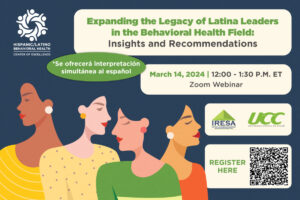
It is widely documented that Latinas are underrepresented in leadership positions. Latinas face the challenges attached to being a woman and being a woman from a minoritized group. Latinas are more likely to face racism, sexism, stereotyping, uneven promotion, and inequality in salaries. Women of Color, including Latinas, repeatedly report having their credentials and competencies challenged in the professional arena and often face the consequences of stereotypes. Recent studies have focused on gaining knowledge from Latinas in leadership roles, where their lived experiences provided an opportunity to actively review, interpret, and connect themes from their journeys. There is a need to further document how culture may influence leadership styles among Latinas. This panel offers an opportunity to share lived experiences of Latinas in leadership roles in the behavioral field while expanding on how culture has influenced their leadership styles.
Objectives:
Identify barriers that currently exist that may interfere with Latinas being promoted to leadership roles.
Understand how cultural values may influence leadership styles among Latinas.
Address how to navigate these barriers through narratives of lived experiences.
Understanding and Identifying Teenage Dating Violence in Hispanic and Latine Communities
In this presentation, participants will explore the intricate landscape of teenage dating violence within Hispanic and Latine communities. Attendees will uncover the cultural nuances that influence relationship dynamics, including traditional values and gender roles. Throughout the session, participants will learn to recognize warning signs, both behavioral and physical, specific to this demographic, while addressing the unique barriers that prevent individuals from reporting abuse. The presentation will delve into effective therapeutic approaches grounded in cultural competence, such as trust-building communication, collaborative family therapy, and empowering education. Don't miss this opportunity to enhance your cultural competence and therapeutic toolkit.

Presenter:
Michelle Evans, DSW, LCSW, CADC
Dr. Michelle Evans is a Licensed Clinical Social Worker, Certified Alcohol and Drug Counselor, and Licensed Sex Offender Treatment Provider and Evaluator. She has worked in primarily with the Hispanic/Latine population throughout her career as a child welfare specialist and forensic evaluator and treatment provider. She is currently the Chief Executive Officer at Elgin Mental Health Center in Elgin, Illinois, a state forensic psychiatric hospital. She is in private practice at Nickerson & Associates, PC as a bilingual therapist where she treats adults and adolescents with mental health issues, substance abuse issues and sex addictions. She also teaches on these topics at Aurora University and University of Chicago. Previously, she was the Assistant Dean for Health Professions and Public Service at Waubonsee Community College, and she has held other positions within private psychiatric hospitals. Throughout her career, she has worked to increase equity, justice and cultural awareness in these institutions. Michelle Evans earned a Doctor of Social Work and a Master of Social Work degree from Aurora University in Aurora, Illinois
Nurturing Mentoring Relationships among Hispanic and Latine Behavioral Health Trainees and Providers
Mentoring relationships play a pivotal role in cultivating the personal and professional development of behavioral health professionals. In the context of cultural nuances and diverse backgrounds, mentors provide a vital bridge, offering insights and guidance into how to effectively navigate the complexities of mental health settings while addressing the unique challenges that come with being of service to the Hispanic and Latine community. Therefore, mentoring relationships serve as invaluable pathways for knowledge transfer, advocacy, and the acquisition of practical skills that extend beyond formal education.
Join us for an insightful webinar panel which will delve into essential aspects of mentoring from a culturally responsive perspective, with a particular focus on the unique experiences and relationships Hispanic and Latine mentors and mentees can build within the behavioral health field. Our distinguished speakers will discuss the significance of cultivating validating and responsive mentorship practices, essential for promoting leadership, growth, and retention of the Hispanic and Latine behavioral health workforce. Recognizing the intersection of multiple identities (e.g., ethnicity, gender), mental health, and mentorship, insights will be shared regarding how validating mentoring relationships can help foster the professional and personal development of Hispanic and Latine trainees and providers.
Who should attend?
This is a basic level workshop designed for mental health providers including psychologists, clinical social workers, mental health counselors, and graduate level students in the mental health field
About the presenters:
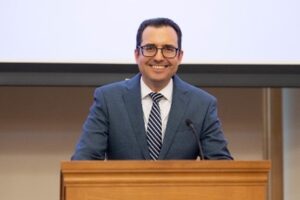
Manuel Paris, Psy.D. is an Associate Professor of Psychiatry at the Yale University School of Medicine and Deputy Director of Hispanic Services for the Connecticut Mental Health Center. He also serves as Director of Training for the Latine Track of the Yale Psychology Pre and Post-Doctoral Fellowship Program at the Hispanic Clinic. His professional efforts focus on the evaluation of cultural/linguistic adaptations of evidence-based interventions, multisite training and fidelity monitoring, workforce development, and public policy advocacy.
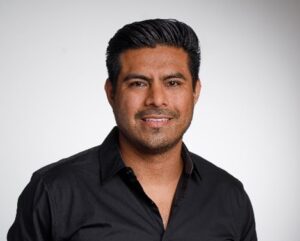
Oscar F. Rojas Perez is a licensed clinical psychologist and assistant professor in the Department of Psychiatry at the Yale University School of Medicine. Oscar has mostly studied Latine psychological well-being, trauma, scale development, and culturally responsive interventions. Clinically, Oscar works with individuals who have experienced trauma, including racial trauma, and who self-identify as immigrants, refugees, and as people color. He provides culturally responsive care through the use of Motivational Interviewing and Cognitive Behavioral Therapy.
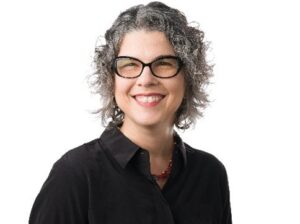
Dr. Domenech Rodríguez’s work addresses health disparities through scholarship, teaching/training, and mentorship. Her scholarship on cultural adaptations of evidence-based interventions addresses health disparities in access, acceptability, and effectiveness of treatment for ethnic and culturally diverse people. The work on cultural adaptations spans the gamut from specific trials, to advances in theory development, to meta-analytic examination of impacts of cultural adaptations on treatment effectiveness Dr. Domenech Rodríguez has improved accessibility to training in evidence-based interventions for providers working with ethnic and culturally diverse clients. Her courses in multiculturalism and diversity prepare psychologists entering the workforce from the undergraduate or graduate level to attend to diversity and equity in their professional pursuits. Her approach to teaching/training is systematic and evidence-based. She has mentored 25 doctoral students to completion. Dr. Domenech Rodríguez has advanced an agenda to reduce health disparities through leadership. Specifically, she is editor of Family Process [IF = 3.9]. She is a past chair of the Institutional Review Board for the Protection of Human Participants in Research (2012-2-23), is a past president of the National Latine Psychological Association (2016), and a past president of Psi Chi, the International Honor Society in Psychology (2018-2019).
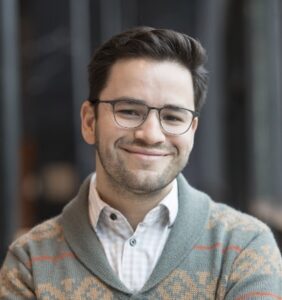
Dr. Germán A. Cadenas is an Associate Professor of Clinical Psychology in the Graduate School of Applied and Professional Psychology (GSAPP) and inaugural Associate Director of the Center for Youth Social Emotional Wellness (CYSEW). Dr. Cadenas identifies as an immigrant from Latin America and his academic work is community-based, with intersecting foci on the psychology of immigration and on critical consciousness as a tool for social justice. This includes the development and validation of strategies to support the psychological wellbeing, education, career/work, and health of immigrants and other underserved communities. He is an Associate Editor of Journal of Counseling Psychology and serves on the Advocacy Coordinating Committee (ACC) of the American Psychological Association. He was recently appointed to the APA Presidential Task Force on Immigration and Health and was among the leaders convened by the White House to discuss the Venezuelan diaspora in the U.S.
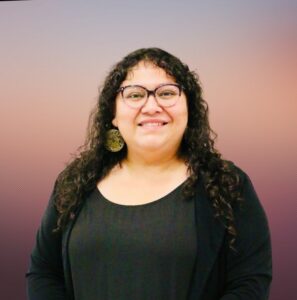 Mirla Lopez Saldierna, CHW-I (instructor) serves as the Program Director for the Healthy Connections/Household Centered Care Program at the University of Houston's Tilman J. Fertitta Family College of Medicine. The program focuses on providing support to community members by addressing non-medical drivers of health through a home visitation resource navigation approach. The home visits are done with inter-professional teams composed of community health workers, medical, nursing, and social work students. Mirla, originally from Mexico, migrated to the United States with her mother and younger brother when she was just six years old. She received a bachelor's degree in liberal arts from the University of Texas at Austin as an undocumented student and received DACA (Deferred Action for Childhood Arrivals) in 2014. Mirla is a certified Community Health Worker and a Community Health Worker Instructor and has worked in research and program evaluation, program development, immigration, education access, family and community engagement. In her leisure time, Mirla enjoys cooking, biking, watching movies, and reading. Being an avid reader, she is constantly on the lookout for captivating books to delve into.
Mirla Lopez Saldierna, CHW-I (instructor) serves as the Program Director for the Healthy Connections/Household Centered Care Program at the University of Houston's Tilman J. Fertitta Family College of Medicine. The program focuses on providing support to community members by addressing non-medical drivers of health through a home visitation resource navigation approach. The home visits are done with inter-professional teams composed of community health workers, medical, nursing, and social work students. Mirla, originally from Mexico, migrated to the United States with her mother and younger brother when she was just six years old. She received a bachelor's degree in liberal arts from the University of Texas at Austin as an undocumented student and received DACA (Deferred Action for Childhood Arrivals) in 2014. Mirla is a certified Community Health Worker and a Community Health Worker Instructor and has worked in research and program evaluation, program development, immigration, education access, family and community engagement. In her leisure time, Mirla enjoys cooking, biking, watching movies, and reading. Being an avid reader, she is constantly on the lookout for captivating books to delve into.
Meet Our Center | Hispanic Latino Behavioral Health Center of Excellence
Join us for the official launch event of the Hispanic/Latino Behavioral Health Center of Excellence (H/LBH CoE). As part of this virtual event, the center's team will be present to discuss its mission, focus areas and services aimed at advancing behavioral health equity for Hispanic and Latine communities. The H/LBH CoE's new official webpage will also be showcased.
Understanding the Diverse Identities of Hispanic and Latino Populations
The H/LBHCoE has teamed up with the Pew Hispanic Research Center to conduct a virtual training on the diversity and behavioral health needs of Latinos in the US. Presenters will discuss how different groups within Hispanic and Latine communities may self-identify, pertinent socio-demographic factors to their mental health, and associated processes such as acculturation and assimilation. Recommended person-centered assessment questions and approaches when working Hispanic and Latine individuals will also be discussed.
Who should attend? This is a basic level workshop designed for mental health providers including psychologists, clinical social workers, mental health counselors, and graduate level students in the mental health field
About the presenters:
Mark Hugo López, Ph.D.
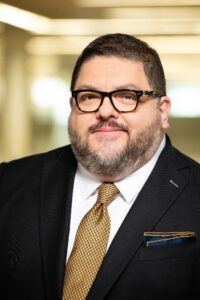
Mark Hugo Lopez is director of global migration and demography research at Pew Research Center. He leads planning of the Center’s research agenda on international demographic trends, international migration, U.S. immigration trends and the U.S. Latino community. He is an expert on immigration globally and in the U.S., world demography, U.S. Hispanics and Asian Americans. Lopez was previously the Center’s director of Hispanic research, and prior to that served as the associate director.
Lopez is the co-editor of “Adjusting to a World in Motion: Trends in Global Migration and Migration Policy.” He is a co-author of “The Future of the First Amendment” and has contributed chapters to several books about voting and young Latinos.
Prior to joining Pew Research Center, Lopez served as a research assistant professor at the University of Maryland’s School of Public Policy and as research director of the Center for Information and Research on Civic Learning and Engagement (CIRCLE).
Lopez received his doctorate in economics from Princeton University. He is an author of reports about the Hispanic electorate, Hispanic identity and immigration. Lopez frequently appears in national and international media in both Spanish and English.
Erick Senior Rogés, Ph.D.
Dr. Erick Senior-Rogés presently holds the position of Training and Technical Assistance Manager at the H/LBH CoE and previously served as the Training and Content Specialist for the National Hispanic and Latino Mental Health Technology Transfer Center (MHTTC). He holds a master's degree in psychology from The New School for Social Research and a Ph.D. in Clinical Psychology from the University of Puerto Rico.
Dr. Senior-Rogés has actively contributed to research-based efforts focused on the mental health and wellbeing of Hispanic and Latine populations, including as a Study Coordinator for the Albert Einstein School of Medicine and with the Behavioral Sciences Research Institute in Puerto Rico. He is dedicated to clinical work and promising practices tailored to the needs of Hispanic and Latine communities and experienced providing culturally responsive psychotherapy services to immigrant families and as part of post-disaster mental health recovery efforts in Puerto Rico with the Hispanic federation.
 Diane Arms, MA Diane Arms currently serves as the Director for The Center for Co-occurring Disorders at The Council on Recovery. She has dedicated her career to serving the Latino population in the Health Field, including Mental Health and Substance Use. She received both her Bachelor of Arts and Master of Arts Degree in Clinical Psychology from the University of Texas at El Paso. Diane has served as Director of Health Integration at Avenue 360 Health and Wellness, Director of Prevention and Counseling at the Association for the Advancement of Mexican Americans and with the Harris County Health Care Alliance as Program Manager facilitating leadership meetings amongst local FQHCs to proactively identify, address, and resolve systemic issues. Ms. Arms has also served as an Operations Administrator for the children’s division unit at Emergence Health Network, El Paso’s Local Mental Health Authority. She has successfully implemented programs such as Multisystemic Therapy in a Mental Health Setting and Transition Age Youth, assisting transitioning clients from children’ services to adult services in the mental health system. She spearheaded the transition of in person clinical and behavioral health services of the agency to telehealth services to accommodate social distancing and stay at home orders due to COVID 19. Previously funded projects consist of identifying relationships between stress, depression and anxiety to substance use and parenting styles in young adult Latinos, investigating the effects of chronic illnesses on children’s health-related quality of life in the Colonias, an underserved and impoverished neighborhood along the Texas-Mexico border, and exploring effective decision-making aids on colorectal cancer for the aging Latino population. She sits on the Houston BARC Foundation’s board, the City of Houston’s Animal Shelter and Adoption Facility. She is also a fellow of the American Leadership Forum, Class 44.
Diane Arms, MA Diane Arms currently serves as the Director for The Center for Co-occurring Disorders at The Council on Recovery. She has dedicated her career to serving the Latino population in the Health Field, including Mental Health and Substance Use. She received both her Bachelor of Arts and Master of Arts Degree in Clinical Psychology from the University of Texas at El Paso. Diane has served as Director of Health Integration at Avenue 360 Health and Wellness, Director of Prevention and Counseling at the Association for the Advancement of Mexican Americans and with the Harris County Health Care Alliance as Program Manager facilitating leadership meetings amongst local FQHCs to proactively identify, address, and resolve systemic issues. Ms. Arms has also served as an Operations Administrator for the children’s division unit at Emergence Health Network, El Paso’s Local Mental Health Authority. She has successfully implemented programs such as Multisystemic Therapy in a Mental Health Setting and Transition Age Youth, assisting transitioning clients from children’ services to adult services in the mental health system. She spearheaded the transition of in person clinical and behavioral health services of the agency to telehealth services to accommodate social distancing and stay at home orders due to COVID 19. Previously funded projects consist of identifying relationships between stress, depression and anxiety to substance use and parenting styles in young adult Latinos, investigating the effects of chronic illnesses on children’s health-related quality of life in the Colonias, an underserved and impoverished neighborhood along the Texas-Mexico border, and exploring effective decision-making aids on colorectal cancer for the aging Latino population. She sits on the Houston BARC Foundation’s board, the City of Houston’s Animal Shelter and Adoption Facility. She is also a fellow of the American Leadership Forum, Class 44.





 Mirla Lopez Saldierna, CHW-I (instructor) serves as the Program Director for the Healthy Connections/Household Centered Care Program at the University of Houston's Tilman J. Fertitta Family College of Medicine. The program focuses on providing support to community members by addressing non-medical drivers of health through a home visitation resource navigation approach. The home visits are done with inter-professional teams composed of community health workers, medical, nursing, and social work students. Mirla, originally from Mexico, migrated to the United States with her mother and younger brother when she was just six years old. She received a bachelor's degree in liberal arts from the University of Texas at Austin as an undocumented student and received DACA (Deferred Action for Childhood Arrivals) in 2014. Mirla is a certified Community Health Worker and a Community Health Worker Instructor and has worked in research and program evaluation, program development, immigration, education access, family and community engagement. In her leisure time, Mirla enjoys cooking, biking, watching movies, and reading. Being an avid reader, she is constantly on the lookout for captivating books to delve into.
Mirla Lopez Saldierna, CHW-I (instructor) serves as the Program Director for the Healthy Connections/Household Centered Care Program at the University of Houston's Tilman J. Fertitta Family College of Medicine. The program focuses on providing support to community members by addressing non-medical drivers of health through a home visitation resource navigation approach. The home visits are done with inter-professional teams composed of community health workers, medical, nursing, and social work students. Mirla, originally from Mexico, migrated to the United States with her mother and younger brother when she was just six years old. She received a bachelor's degree in liberal arts from the University of Texas at Austin as an undocumented student and received DACA (Deferred Action for Childhood Arrivals) in 2014. Mirla is a certified Community Health Worker and a Community Health Worker Instructor and has worked in research and program evaluation, program development, immigration, education access, family and community engagement. In her leisure time, Mirla enjoys cooking, biking, watching movies, and reading. Being an avid reader, she is constantly on the lookout for captivating books to delve into.
